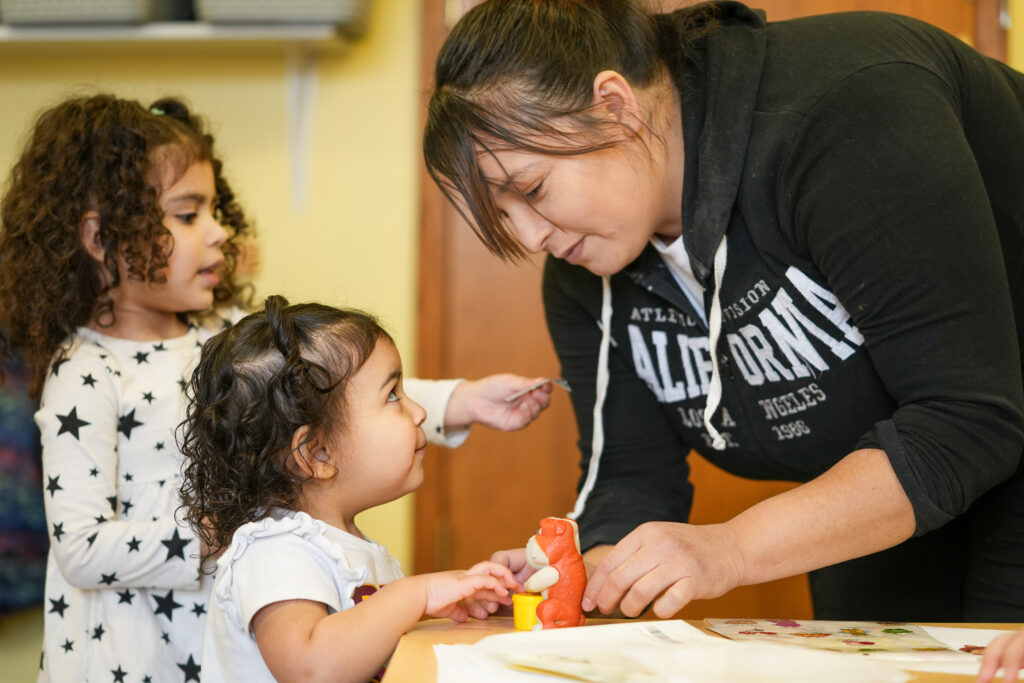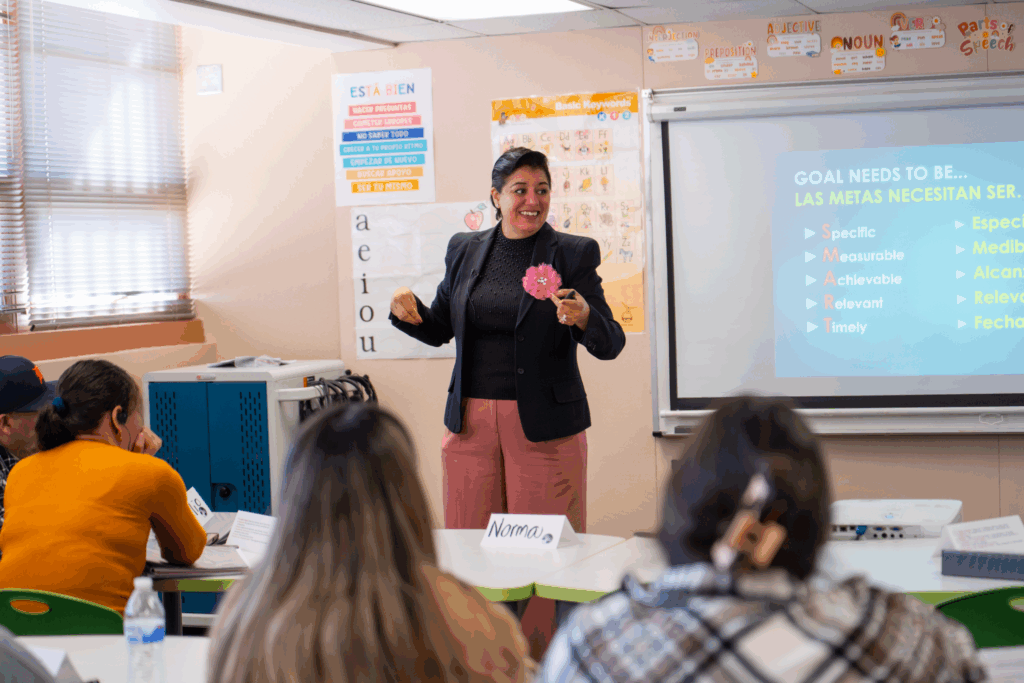Built to last: Family learning sustainability lessons from Nebraska and Arizona
Editor’s Note: This post is co-authored by three NCFL staff, Sherri Hudson, director, Southwest; Brian Welch, director, Nebraska; and Hannah Van Horn, training specialist.
As Dr. Smith noted in her recent blog post on sustainability, there are key factors that help drive sustainability efforts for programmatic efforts and practices. At NCFL, we’ve seen these factors in play on the ground in multiple states through our Statewide Family Engagement Center (SFEC) efforts. SFECs are designed to advance family engagement partnerships to build state capacity and improve learning outcomes. While NCFL has been involved in SFEC efforts across the country, two states—Arizona and Nebraska—provide recent examples of the ways that sustainability efforts can be built on ownership, relationships, and impact.
The collective impact of the Nebraska and Arizona SFECs has reached families across both states in powerful and lasting ways. An evaluation conducted across Nebraska and Arizona highlights key areas of success, including positive education-related parent behaviors, improved parent-child relationships, increased parent/school connection and engagement, positive change in at-home reading behaviors, and achievement of adult learning and career goals. This was achieved through the high-quality implementation of the family literacy model, family leadership experiences, and family engagement activities. The success of this work has laid a strong foundation for sustainability. Both Arizona and Nebraska are now building on these results by investing in long-term strategies to sustain and expand family learning efforts.
NEBRASKA
The Nebraska SFEC has steadily built a high-impact, statewide infrastructure to support families. For example, in Crete, a focus on family in the adult education program has led to over 50% of participants achieving proficiency and increased retention rates. An intentional and collaborative effort has led to measurable gains for parent participants statewide. The voices of these participants further illustrate the deep and lasting impact of this work. They speak of greater confidence in navigating school systems, stronger connections with their children, and a deeper sense of belonging. Parents shared the value of family literacy in their lives:
- “One thing our program did was to help us stay in contact with our children’s school, and we get to see how active they are in their classrooms.” – Millard, NE
- “It is more than a program, it is a community and family, and that is why we are still involved.” – Bellevue, NE
- “When I tried to help my daughter with homework, I would do it in Spanish in what made sense to me, but my daughter would not understand. Now I can help her in English in a way that she understands.” – Columbus, NE

This work has been sustained through a strong network of statewide relationships between partner organizations and among the families being served. For Zainab Rida of the Nebraska Department of Education, initiatives such as Together Better and the Afghan refugee family engagement program not only align with the state’s mission but also enrich the lives of families across Nebraska. Ask Joe DiCostanzo of Nebraska Children and Families Foundation, and he’ll point to the strength of cross-sector collaboration, especially during and after the COVID-19 pandemic, as a driving force behind improved adult literacy and more inclusive educational outcomes.
Recent shifts in Nebraska’s education policy have been influenced in part by the demonstrated success of family literacy initiatives, helping to lay the groundwork for sustained investment in family literacy programs. In January of 2024, Nebraska Legislative Bill 1284 was passed to support evidence-based reading instruction. Among other things, the bill wanted “to strengthen home and family literacy programs and better instruct children in reading.” This led the NE State Board of Education to adopt legislative priorities for 2025-2027 with “Foundational Literacy” listed first. As part of that priority, the State Board of Education determined to focus on family and adult literacy strategies as well as state investment in statewide family engagement centers.
NCFL and the Nebraska SFEC continue to elevate promising practices in family literacy through its participation in the Nebraska Literacy Project. The project is intended to provide “a framework for Nebraska educators and other stakeholders to work together to positively impact literacy for all Nebraska students.” Tenet 5 of the Nebraska Literacy Project (Family Literacy and PreK Programs) directly supports the work being done in this area through the creation of a guide to support implementation of family literacy practices in Nebraska. In the 2024-2025 school year, the NE SFEC supported implementation of the 4-component family literacy model in seven communities across the state, impacting over 300 children and families. This is in addition to 10 other communities that have previously been supported.
ARIZONA
The Arizona SFEC, supported by federal grant funding from 2018 through 2023, laid the groundwork for deep family engagement by implementing 14 family literacy programs across six districts in the state. Recognizing the impact and value of deep family engagement through family literacy, 12 of these programs have prioritized funding to sustain their work beyond the grant period. Family literacy programs in Arizona have impacted the way families engage in their children’s education.
Recently, Yuma School District One posted a case study that highlighted a decline in third-grade reading scores during the pandemic at O.C. Johnson Elementary School. However, the school has made a remarkable recovery, with scores in 2024 surpassing pre-pandemic levels: 72% of third graders scored at or above proficiency on Arizona’s ELA assessment. School administration and educators attribute this success to a strong focus on meeting each student’s instructional needs, maximizing learning time, providing high-quality preschool opportunities, and actively engaging families to support student learning through programs such as family literacy. Through these relationships and impact, Yuma School District One recognized the value of family literacy and engagement and has committed to sustaining this important work beyond the initial SFEC funding.
Additionally, the AZ SFEC Parent Leadership Council, launched in 2019, successfully engaged parents in identifying and developing the leadership skills they wanted to strengthen to become more effective advocates in their children’s schools, districts, and communities. This initiative has seen sustained growth in developing leadership skills in the Mesa Public School District; over 100 parents participated in leadership experiences during the current school year. Together, participating parents have collaborated on eight projects that have made a meaningful impact in their schools and communities. Norma Huerta, MPS Family Literacy Liaison states that “parents are already leaders by being their children’s first and most important teacher, once they recognize this, it is only a matter of unlocking their potential as leaders. The AZ SFEC provided them with training that allowed them to obtain essential tools that assisted them to identify their strengths and purpose. When parents lead with purpose, they not only shape their own future but their children’s too and inspire transformation across their families’ lives, schools, district, and community.”

Arizona and Nebraska continue to lead the way in sustaining impactful family engagement and literacy efforts. When parent voice and family engagement are central to education and community wide efforts, it is possible to sustain change and spark innovation that will lead to transformation for generations to come. We invite you to learn more about the innovative work of these two states and their efforts to connect parents and schools for improved student engagement and learning. Join us at the upcoming 2025 Families Learning Conference, happening November 2-5 in Charlotte, North Carolina to explore a variety of family learning topics with our network of national and state partners, educators, researchers, and policymakers.
About the Authors

Sherri Hudson
Director, Southwest
Sherri Hudson provides high-quality coaching and professional development for families and educators across Arizona. Sherri brings over 27 years of education experience to NCFL, previously working in early childhood education, family engagement, and professional development across multiple environments.
She holds a Bachelor’s in Elementary Education, a Master’s in Reading Curriculum and Instruction, and is National Board Certified in Early Childhood Education.

Brian Welch
Director, Nebraska
Brian Welch is the Director of the Nebraska Statewide Family Engagement Center. He comes from the Nebraska Department of Education (NDE) where he was the Family and Community Engagement Specialist focusing on aligning efforts and connecting various teams and departments with community partners. He also led efforts developing resources to support schools and districts in their family and community engagement efforts. Prior to working at NDE, he taught 6th grade English Language Arts for 9 years. This experience highlighted the importance of collaborative partnerships between families, communities, and schools.
Brian holds a Bachelor’s in English Education from Brigham Young University–Idaho and a Master’s in Instructional Technology from Fort Hays State University.

Hannah Van Horn
Training Specialist
Hannah Van Horn works closely with local school districts across Nebraska to implement family literacy and family engagement programming. Prior to joining NCFL, Hannah spent two years teaching in Oklahoma City as an early childhood teacher in a district where she had the opportunity to serve ethnically and socio-economically diverse students and families. She also interned in the Colorado House of Representatives, exploring education policy and issues.
Hannah holds a Bachelor’s Degree in Political Science from Colorado State University.